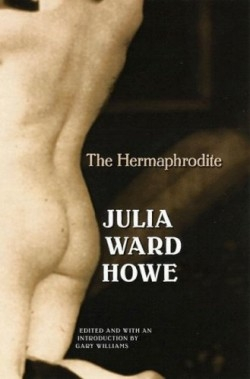
The Hermaphrodite
Why would anyone ever want to be a woman? This is the question haunting the pages of this 400-page never-before-published novel from the 1840s. Laurence, a hermaphrodite, chooses the freedom of life as a man and despises womankind so thoroughly that the mere sight of one makes him ill.
The editor of this volume also wrote Hungry Heart: The Literary Emergence of Julia Ward Howe, a biography of this remarkable author, who also penned Passion-Flowers, Words for the Hour, The World’s Own, and, of course, the words to “The Battle Hymn of the Republic.” The critical introduction to this volume positions Howe’s manuscript as her attempt to reconcile herself to her husband’s “intimate friendship” with another man. It is also an expression of self-hatred.
The heightened emotions and hothouse claustrophobia of Laurence’s narrative echo conventions of gothic fiction from The Castle of Otranto to The Fall of the House of Usher, while the fervor of its metaphysical angst recalls Dr. Frankenstein’s monster. Cursed by an indeterminate body here on earth, Laurence nonetheless assumes that his place in heaven is assured. He manifests none of the essentialized guilt that marks later texts about sexual difference, and instead adopts a tone of noble victimhood.
Unlike Orlando, the protagonist of Virginia Woolf’s transsexual novel, Laurence views the passion that his beauty inspires in others as unfortunate rather than as an opportunity for adventure. Rejected at birth by his cold-hearted father, Laurence enjoys the educational privileges of the well born and wealthy, but resists all temptations to a life of pleasure. Telling one host that he is “anti-bibulous,” Laurence teetotals his way across Europe, emoting at length about every minute plot detail he places before the weary eyes of his reader.
The writing is overwrought at best, full of tremulous emotion and hyperbole. Laurence rebels against the bonds of flesh at length, asking, “What obligation binds me to languish in patient subjugation to the gross laws of animal being? This blood which should glow with high and ethereal electricity, why should it be degraded to meaner offices, and checked in its upward course to aid in the assimilation of superfluous food?” A little later on, he bemoans that he is “choked with the solid, asphyxiating gases of your materiality” and yearns for the “pure atmosphere of the upper regions.”
The Hermaphrodite will be of interest to scholars of nineteenth-century American literature, feminism, and gender studies. It broadens readers’ understanding of the first half of the nineteenth century by allowing speculation about the limitations that social convention placed on the lives and artistic articulations of those who did not conform to rigid predetermined roles.
Reviewed by
Elizabeth Breau
Disclosure: This article is not an endorsement, but a review. The publisher of this book provided free copies of the book to have their book reviewed by a professional reviewer. No fee was paid by the publisher for this review. Foreword Reviews only recommends books that we love. Foreword Magazine, Inc. is disclosing this in accordance with the Federal Trade Commission’s 16 CFR, Part 255.
